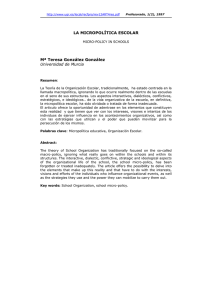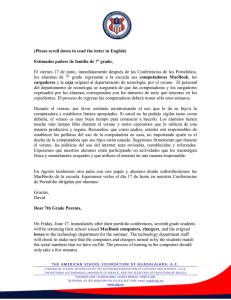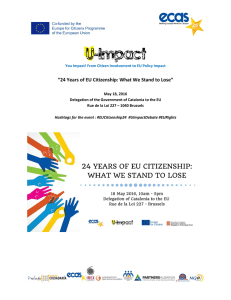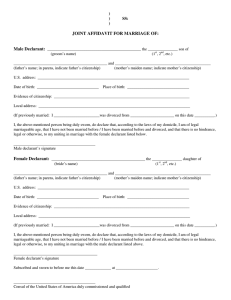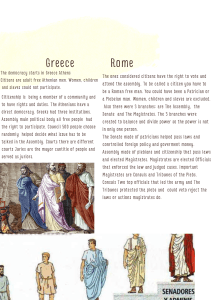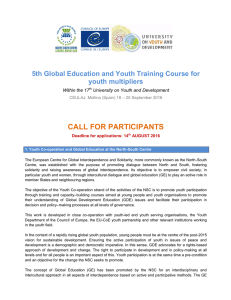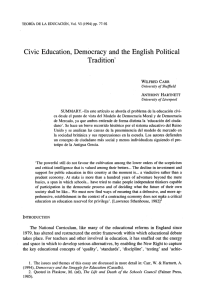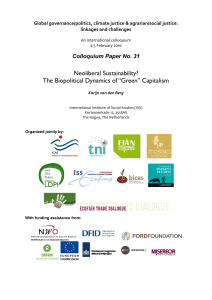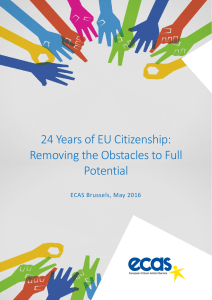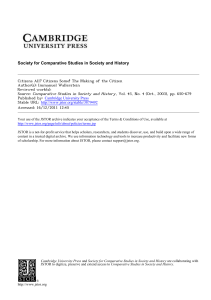3.3.- Contents 1. The Organisation of Freedom: Conflict and
Anuncio
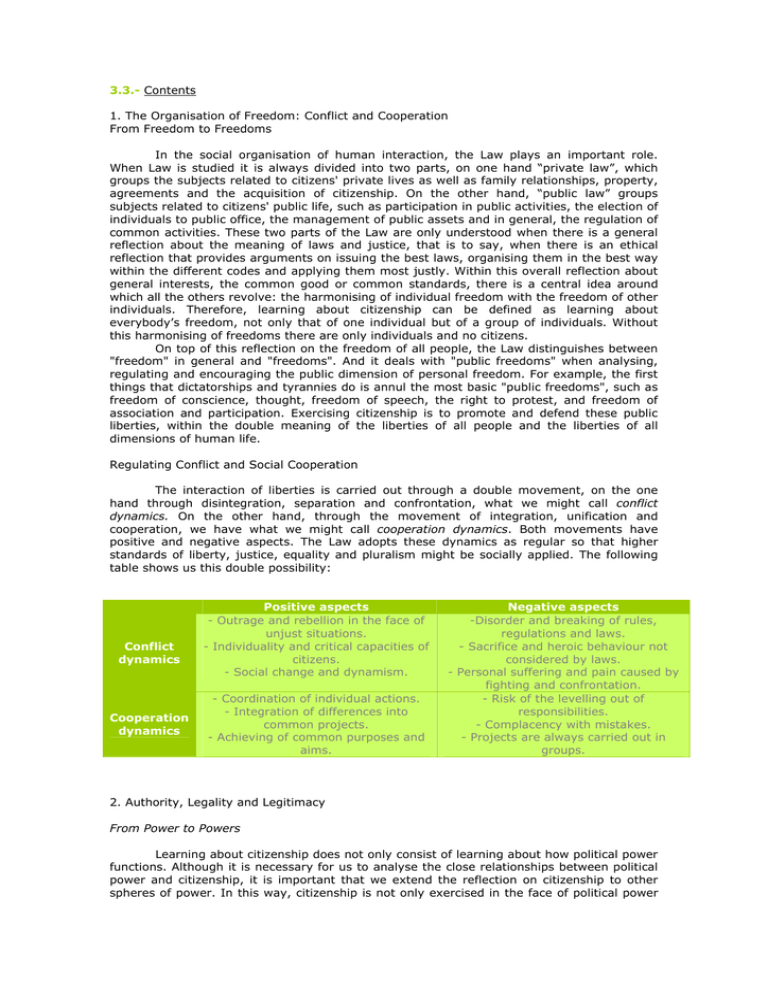
3.3.- Contents 1. The Organisation of Freedom: Conflict and Cooperation From Freedom to Freedoms In the social organisation of human interaction, the Law plays an important role. When Law is studied it is always divided into two parts, on one hand “private law”, which groups the subjects related to citizens' private lives as well as family relationships, property, agreements and the acquisition of citizenship. On the other hand, “public law” groups subjects related to citizens' public life, such as participation in public activities, the election of individuals to public office, the management of public assets and in general, the regulation of common activities. These two parts of the Law are only understood when there is a general reflection about the meaning of laws and justice, that is to say, when there is an ethical reflection that provides arguments on issuing the best laws, organising them in the best way within the different codes and applying them most justly. Within this overall reflection about general interests, the common good or common standards, there is a central idea around which all the others revolve: the harmonising of individual freedom with the freedom of other individuals. Therefore, learning about citizenship can be defined as learning about everybody’s freedom, not only that of one individual but of a group of individuals. Without this harmonising of freedoms there are only individuals and no citizens. On top of this reflection on the freedom of all people, the Law distinguishes between "freedom" in general and "freedoms". And it deals with "public freedoms" when analysing, regulating and encouraging the public dimension of personal freedom. For example, the first things that dictatorships and tyrannies do is annul the most basic "public freedoms", such as freedom of conscience, thought, freedom of speech, the right to protest, and freedom of association and participation. Exercising citizenship is to promote and defend these public liberties, within the double meaning of the liberties of all people and the liberties of all dimensions of human life. Regulating Conflict and Social Cooperation The interaction of liberties is carried out through a double movement, on the one hand through disintegration, separation and confrontation, what we might call conflict dynamics. On the other hand, through the movement of integration, unification and cooperation, we have what we might call cooperation dynamics. Both movements have positive and negative aspects. The Law adopts these dynamics as regular so that higher standards of liberty, justice, equality and pluralism might be socially applied. The following table shows us this double possibility: Conflict dynamics Cooperation dynamics Positive aspects - Outrage and rebellion in the face of unjust situations. - Individuality and critical capacities of citizens. - Social change and dynamism. - Coordination of individual actions. - Integration of differences into common projects. - Achieving of common purposes and aims. Negative aspects -Disorder and breaking of rules, regulations and laws. - Sacrifice and heroic behaviour not considered by laws. - Personal suffering and pain caused by fighting and confrontation. - Risk of the levelling out of responsibilities. - Complacency with mistakes. - Projects are always carried out in groups. 2. Authority, Legality and Legitimacy From Power to Powers Learning about citizenship does not only consist of learning about how political power functions. Although it is necessary for us to analyse the close relationships between political power and citizenship, it is important that we extend the reflection on citizenship to other spheres of power. In this way, citizenship is not only exercised in the face of political power but also in the face of any despotic, tyrannical or abusive show of power. It is important to extend the reflection on power to other fields of daily life, such as the financial, professional, civil, family or educational aspects, where we often confuse power with other qualities that are necessary for the organisation of these activities. This way, we can at least distinguish the following types of powers: POWER-COERCION (force); capacity to make someone do something by force. POWER-CONTROL (power); capacity to convince without forcing someone's will. POWER-AUTHORITY (exemplary); capacity to convince by guiding someone's will through example. POWER-LEGALITY (democracy); capacity to convince and make someone comply with the laws, harmonising the liberty of all by seeking the common good. From Authoritarianism to Authority In closed societies, the greatest risk in terms of the use of power in all its guises is authoritarianism, that is to say, to abuse the authority that one has. Sometimes, in sports teams the behaviour of captains or coaches is authoritarian, they abuse the power they are given or the trust deposited in them in order to promote their own interests instead of general or common interests. Active citizenship is one of the best ways of ending any sort of authoritarian behaviour because it promotes the capacity to criticise, participation and joint responsibility in the exercising of freedom. In fact, active citizenship helps us to distinguish, in all elements of life, between power (and its forms) and authority (and its perverted form of authoritarianism). Ways of Recognising Authority: Legality and Legitimacy Even though power and powers arise from the interaction of liberties, we, the citizens do not accept just any sort of power or authority. We demand that powers and authorities have an ethical, political and cultural foundation or basis. This basis or foundation is called legitimacy. According to Max Weber, legality is one of the ways of legitimising political power and it has become the most accepted way of breaking away from all sorts of authoritarianism, thus promoting spaces for democratic citizenship. TYPES OF LEGITIMACY FOR POLITICAL POWER ACCORDING TO MAX WEBER Traditional legitimacy Charismatic legitimacy Legitimacy based on constitutional legality Characterised by: Tradition is the source or basis for power; “doing things as they have always been done”. Personal charisma is the source or basis for power: “because of his charisma or personal qualities”. The rule of law, laws or the constitution are the source or basis for power: “in line with the law”. 3.-The Promotion of Justice: Rights and Responsibilities The Law: Between Law and Rights Learning about citizenship is directly related to the learning of laws. This does not mean that those who know all the laws by heart are better citizens than those who do not know them. We mean that active participation in a social and political organisation is supported by or based on (legitimised by) an ordered set of laws. This systematised and ordered set of laws receives the name of Law. Unlike the social habits, customs or right or wrong forms of social behaviour, this is about written rules, structured and organized according to the subject they regulate. For example, the highway or traffic code gathers in a written, structured and organised manner the laws that regulate driving. In the same way civil or criminal codes bring together the laws that regulate property or crimes against a person's life. Law is also referred to in terms of the right to make a claim for a just cause, for example when we say "I have the right to X”, as if it says: “it is justice that I am granted X". In this sense, the term “rights” describes the pretensions of justice that people or citizens claim before legally constituted authorities. Justice: Between Responsibility and Responsibilities Learning about citizenship is also directly related to learning about responsibilities. In the same way that we cannot separate heads from tails on coins, neither can we separate rights from responsibilities. Any claim of a just cause entails a responsibility exercised by the person who carries it out. If some neighbours demand sports facilities for their neighbourhood because they have the right, they have to do it in a responsible manner, that is to say, using the adequate methods, attending to the corresponding institutions and, above all, taking joint responsibility for the claim. That is why we speak about responsibilities in plural, as, apart from legal responsibilities, there are others, which can be social, cultural or civil. Activity: Good citizens or well-behaved citizens? At the end of the 18th century the philosopher Immanuel Kant was posed an important problem related to citizenship. What is the relationship between a good person and a good citizen? Is it necessary to be a good person (in moral terms) in order to be a good citizen (in legal terms)? Kant was so convinced about the value and importance of citizenship that he asserted that even a town of intelligent devils would be interested in coexistence among citizens. “Man is obliged to be a good citizen although he is not obliged to be a morally good man. The establishing of a state has a solution, even for a town of devils, as surprising as it might sound, whenever they are intelligent, and the problem can be formulated as follows: “Organising a crowd of rational human beings who, for their conservation, jointly demand universal laws, even when each one tends internally to evade the law means establishing a own constitution so that, although their particular feelings are the opposite, they please both, so that the result of their public behaviour would be the same as if they did not have such inclinations. (Kant, Perpetual Peace, Tecnos, Madrid). - Do you agree with Kant? Can a good person be a bad citizen? Can a good citizen be bad person? Find reasons for your answer. 4. Learning Citizenship through Coexistence at School The Most Familiar Spaces for the Participation of Citizens Besides learning about rights and responsibilities, learning about citizenship is learning about feelings. Even though they appear in writing in a code or document, rights and responsibilities are not part of a lesson of civic responsibility that we have to learn by heart. They are part of a lesson of civic responsibility that has to be performed during our daily lives and, above all, in those spaces where we usually exercise our freedom. We do not study the constitution or human rights in order to know them by heart, rather we study them in order to be better citizens. This means that citizenship has a vital and practical dimension that is a task, a training programme, and an exercise. In the same way as before playing a game or carrying out a sporting activity we have to perform warmup exercises to be in shape and give the best of ourselves to the team, so we have to understand and train in the rights and responsibilities of our most familiar spaces. The School: A Space with Rights and Responsibilities In order to perform this warm-up it might be interesting to know the rules that govern coexistence in the schools to which we belong and in which we participate. Let's remind ourselves of this dynamic of rights and responsibilities through the following table from which we have taken some articles. Derechos de los alumnos Deberes de los alumnos Art. 15. 1. Todos los alumnos tienen derecho a recibir una formación integral que contribuya al pleno desarrollo de su personalidad. 2. Para hacer efectivo este derecho, la educación incluirá: a.- la formación en valores y principios recogidos en la normativa internacional, la Constitución española y el Estatuto de Autonomía. b.- La consecución de hábitos intelectuales y sociales, y estrategias de trabajo, así como los necesarios conocimientos científicos, técnicos, humanísticos, históricos y uso de las tecnologías de la información y la comunicación. c.- La formación integral de la persona y el conocimiento de su entorno social y cultural inmediato, y en especial de la lengua, historia, geografía, cultura y realidad de la sociedad actual…./…. 3. Los alumnos tienen el derecho a que sus padres, madres o tutores velen por su formación integral, colaborando para ello con la comunidad educativa, especialmente en el cumplimiento de las normas de convivencia y de medidas establecidas que favorezcan el esfuerzo y el estudio. Art. 24. 1. El estudio es un deber básico de los alumnos, que comporta el desarrollo y aprovechamiento de sus aptitudes personales y de los conocimientos que se impartan. 2. La finalidad del deber del estudio es que, por medio del aprendizaje efectivo de las distintas materias que componen los programas, los alumnos adquieran una formación integral que les permita alcanzar el máximo rendimiento académico, el pleno desarrollo de su personalidad, la adquisición de hábitos intelectuales y técnicas de trabajo, la preparación para participar en la vida social y cultural, y la capacitación para el ejercicio de las actividades profesionales. 3. Este deber, que requiere del esfuerzo, la disciplina y la responsabilidad se concreta en las siguientes obligaciones: a.- actitud activa, participativa y atenta en clase, b.- participar en actividades formativas c.- asistir con material y equipamiento necesario d.- realizar las tareas encomendadas por los profesores, …/… f.- respetar el ejercicio del derecho y el deber del estudio de los demás…. Activities; 1. Observe how the rules and regulations of your school are organised. Analyse the number of articles, titles and sections of these rules and regulations and observe the progression and development being used. 2. Read the rights and obligations that we give you here as an example throughly. Summarise them in your own words. What are the standards that are underlined and defended?

